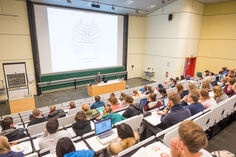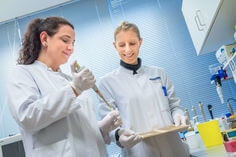Research in the Department of Cardiovascular Physiology focuses on remodelling processes in the cardiovascular system induced by biomechanical factors, e.g. in the case of high blood pressure or arteriosclerosis. In addition, various mechanisms of the interaction of endothelial cells with leukocytes and thrombocytes are analysed in the context of chronic inflammatory diseases, which, among other things, represent a risk factor for the development of arteriosclerosis. Other areas of work include the characterisation of cardiomyocytes differentiated from induced pluripotent stem cells and their cultivation under 3D conditions as a basis for tissue engineering approaches, as well as the effects of oxygen deficiency, such as occurs in strokes, on the brain.
New publications
The role of connexin-43 in modelling arrhythmogenic diseases with induced pluripotent stem cell-derived cardiomyocytes. J Mol Cell Cardiol. 2025 May 26;204: 79-88. doi: 10.1016/y.yjmcc.2025.05.008.
Stabilisation of extracellular matrix is crucial to rapamycin-mediated life span increase in Marfan mgR/mgR mice. Biochem Pharmacol. 2025 Feb 26; 235:116830. doi: 10.1016/j.bcp.2025.116830.
Adequate post-ischemic reperfusion of the mouse brain requires endothelial NFAT5. Acta Neuropathologica Communications 2024 Dec 22;12(1):200. doi: 10.1186/s40478-024-01918-5.
Nuclear factor of activated T-cells 5 is indispensable for a balanced adaptive transcriptional response of lung endothelial cells to hypoxia. Cardiovasc Res. 2024 Nov 5;120(13):1590-1606. doi: 10.1093/cvr/cvae151.



![[Translate to English:] [Translate to English:]](/fileadmin/_processed_/9/b/csm_Firefly_Abstract_organic_flow_resembling_blood_vessels_shaped_as_a_tool__composed_of_glowing_651800_26778ea790.png)
